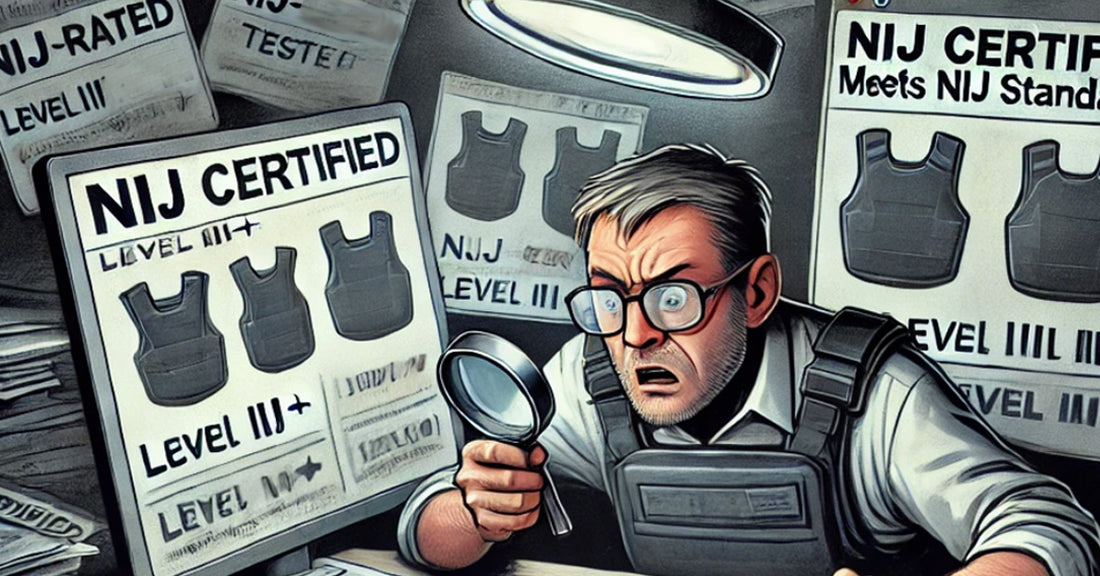
Misleading Protection: Marketing Ballistic Plates & the NIJ Test Standards
Share
Navigating the Confusion of Ballistic Plate Purchases
For many first-time buyers, purchasing ballistic plates can be confusing and overwhelming. This confusion is only exacerbated by the growing prevalence of e-commerce, misleading marketing tactics, and scams. One common area of misunderstanding involves the use of terms related to the National Institute of Justice (NIJ), such as "NIJ Tested," "NIJ-Rated," or "Compliant with NIJ Requirements." While these phrases may sound reassuring, they do not necessarily mean the product is officially NIJ-certified.
Historical Overview of NIJ Standards
The NIJ had played a key role in setting ballistic protection standards since 1972 when it was initially known as the National Institute of Law Enforcement and Criminal Justice (NILECJ). After the conclusion of the Vietnam War in 1973, the NIJ released its first formal standards for ballistic plates in 1978, known as NIJ Standard 0101.01. Over the years, these standards have evolved to address new technologies and threats, with the most recent update—NIJ Standard 0101.07—released in 2020. However, the previous version, NIJ Standard 0101.06, continues to be widely referenced.
NIJ certification is a stringent process that ensures body armor meets established safety and performance benchmarks. Once a product passes independent laboratory testing, it is listed on the NIJ Compliant Products List, ensuring buyers that the armor meets minimum protection requirements against specific ballistic threats.
Understanding NIJ Standards 0101.06 and 0101.07
The purpose of the NIJ Standards 0101.06 and 0101.07 is to set clear benchmarks for the performance and safety of ballistic armor. NIJ Standard 0101.06, published in 2008, focused on defining minimum requirements for body armor to protect against specific ballistic threats, including handgun and rifle rounds. It became the industry standard for over a decade, offering a comprehensive testing process to ensure reliability under various conditions. In 2020, NIJ Standard 0101.07 was introduced to reflect material advances and emerging threats. This updated standard emphasizes multi-threat protection, including protection against high-velocity rounds, while incorporating more stringent testing for environmental factors such as heat, moisture, and wear over time. These standards help buyers and law enforcement agencies identify reliable body armor that meets proven safety criteria.
The Importance (and Limitations) of NIJ Certification
Although NIJ certification offers peace of mind, it is essential to note that adherence to these standards is voluntary. Manufacturers and law enforcement agencies are not legally required to comply, though many choose to do so to provide a layer of assurance about their product's effectiveness (Body Armor NIJ Standard 0101.07, 2023, p. 7). Only ballistic armor that complies with the 0101.06 standard is listed on the official NIJ Compliant Products List. Each entry includes crucial details such as the manufacturer's name, threat level, model designation, and warranty.
A product with an "Active" status must appear on this list to be officially considered NIJ-certified. Other statuses, such as "Suspended" or "Inactive," indicate that a model may no longer be in production or has temporarily lost its certification. However, existing units of these models may still comply with the older standard.
Understanding Misleading Marketing Practices
In the ballistic protection industry, not all marketing claims are created equal. Buyers must be particularly cautious of retailers using misleading language to sell their products. For instance, manufacturers often use "Level III+" to suggest superior protection, but the NIJ does not officially recognize this rating per the NIJ Compliant Products List. Such claims are typically based on the manufacturer's internal testing and may not adhere to the rigorous standards set by the NIJ. While these products may offer some protection, buyers should approach them cautiously and seek additional verification.
Don't be misled by phrases like "NIJ Tested" or "NIJ Compliant"—these are not the same as "NIJ Certified." Indeed, NIJ-certified plates will be listed on the official NIJ list and bear the NIJ mark of compliance. If a plate displays the NIJ mark of compliance but is not on the NIJ list, it's best to avoid it, and you may want to contact the NIJ-CTP at askctp@nijctp.org for further guidance as listed on the NIJ-CTP Compliant Products List: Ballistic Resistant Body Armor webpage.
NIJ mark of Compliance
Below is how the NIJ Certification Mark appears:

Making an Informed Decision: Our Recommendations
Before making a purchase, it is vital to conduct thorough research. The NIJ Compliant Products List is an excellent starting point for verifying whether the ballistic plate has a valid certification. Even if the specific model is not listed, checking if the manufacturer has other certified products can offer insights into their credibility.
When researching ballistic protection products, relying on unbiased, reputable sources is crucial. While manufacturers' claims can be informative, they may downplay potential product issues or failures. For example, a manufacturer recently suspended a model due to a failure to meet NIJ standards. Such incidents underscore the importance of verifying information independently and not relying solely on manufacturer-provided data.
The Role of Testing Labs in Ensuring Product Safety
Another factor to consider is the testing process itself. NIJ certification is only granted after products pass rigorous testing in certified labs. However, some manufacturers may promote testing results from in-house or third-party labs that lack NIJ accreditation. While these tests may produce promising results, they do not carry the same level of oversight or reliability as those conducted in NIJ-approved labs. Testing not up to NIJ standards could result in products that fail to provide the necessary protection in real-world scenarios, putting users at significant risk.
NIJ-Certified Test Laboratories
To ensure the integrity of the certification process, the NIJ has 5 approved laboratories in the U.S. to conduct ballistic testing:
- Element U.S. Space & Defense (Belcamp)
- Element Materials Technology Wichita
- Energetic Test Labs, LLC
- Oregon Ballistic Laboratories, LLC
- SMS Testing
Disclaimer
This information is intended for educational purposes only and does not serve as a recommendation or endorsement of any specific ballistic plates or manufacturers. While we strive to ensure the accuracy and reliability of the content presented, readers must conduct independent research when selecting ballistic protection. Neither RED OpTec LLC nor the author(s) are liable for any decisions based on this information or for any use or misuse of the content provided. Always verify the certification and claims of any products through trusted sources before purchasing.
